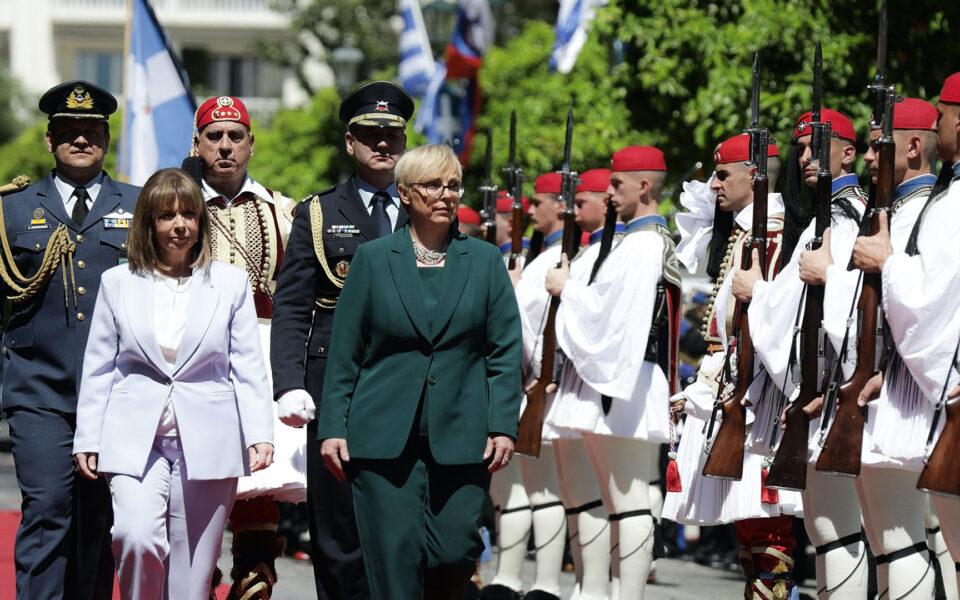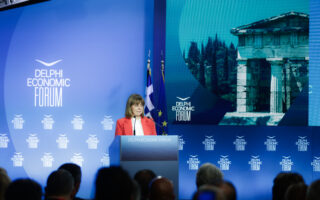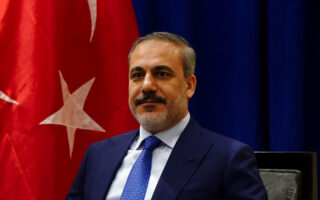’There are no shortcuts’ to EU integration
Slovenian President discusses the EU integration of the Western Balkans and the bloc’s stance toward Ukraine

Every country that wants to become a member of the European Union “must fulfill the conditions,” Natasa Pirc Musar, the president of Slovenia, tells Kathimerini, discussing the integration of the Western Balkans. Musar, who is in Athens for an official visit and met with her Greek counterpart, Katerina Sakellaropoulou, on April 8, also notes that “halting the progress of the candidate countries at all costs does not and will not contribute to the stabilization of the Western Balkans.”
She also reiterated the need to maintain a united front toward Russian aggression in Ukraine.
Much is at stake in terms of European challenges. Can the EU show more cohesion in the face of the geopolitical turmoil resulting from Russian aggression in Ukraine?
The question is not whether the EU can be more cohesive – it needs to be cohesive. I think the Russian Federation understood very well from the EU’s reaction to Russian aggression against Ukraine two years ago how much it can hurt any adversary when Europe is united in its actions. This kind of language and ultimately response must never be changed. If it were changed, it would reveal the weakness of the EU and prove the Euroskeptics correct: that the EU was nothing more than a bunch of states unable to agree on key issues in high politics. Sending this kind of message to the world would be bad news for all its member-states. By the same token, I would advise against individual, uncoordinated statements on how to proceed in this war. Only the voice of a united Europe in defense of Ukraine’s right to territorial integrity, or whatever Ukraine and only Ukraine sees as the way out of the war, is the voice that will count. United we stand, divided we fall.
Greece and Slovenia have some common priorities. One of them is the European integration of the Western Balkan countries. Do you think this process needs to be accelerated?
The integration process is first and foremost a process. It is not about speed. It’s about accepting European values and adopting the acquis communautaire – sometimes that takes longer, sometimes not. However, the candidate countries cannot bear the entire burden of the negotiations. In every story of moving closer to membership, there are always several players involved: the candidate country, the EU institutions with the Commission at the helm, and the member-states. Each of them must make a positive contribution. Halting the progress of the candidate countries at all costs does not and will not contribute to the stabilization of the Western Balkans. Greece and Slovenia are excellent examples of the realization that the Western Balkans should be included in the overall picture of the EU integration process. Both countries faced a difficult dilemma when it came to allaying the greatest concerns about the candidate countries. In the end, Athens and Ljubljana took important steps to find acceptable solutions for the candidate countries, solutions that have definitely contributed to the stabilization of the region. This is my message to the EU member-states which may currently have similar concerns with the current candidate countries.
Must EU integration of the Western Balkans continue at all costs, even if there are problems with respect for the rule of law?
Again, EU integration did not happen at one stroke. It is a process. It has been a process since the 1950s when the three communities were founded. Ultimately, however, the vision must prevail for the Western Balkans to become what it is – a natural part of a united Europe. Each individual country must fulfill the conditions, there are no shortcuts. The pace of accession is primarily determined by the countries that want to join the EU, but the EU and the member-states must show more commitment to tell the countries of the Western Balkans, Ukraine, Moldova and Georgia that they are welcome. Slovenia has a strong record of helping these countries with the support and exchange of knowledge that we have gained in 20 years of EU membership.
You have met with your Greek counterpart several times. Do you think that the fact that two women are at the head of their respective countries is a role model for society? Are you satisfied with the position that women have achieved in your own country?
For sure, I believe that President Sakellaropoulou and I are a role model for our societies. In many countries around the world, women are still in the minority in politics and leadership positions. Fortunately, this is not currently the case in Slovenia. I am probably not far off the mark when I say that Slovenia is the world leader in terms of the number of women in leadership positions in the country: Apart from me, we have a woman president of the National Assembly, a woman minister of foreign and European affairs, and a woman attorney general, as well as 40% female members of Parliament. I think that this is a very, very important message for Slovenian society and I very much hope that we will never again return to the situation where only men lead Slovenian politics. Do not get me wrong: I am not saying that women should occupy leadership positions at all costs. All I’m saying is that a person who wants to compete for a top job, political or otherwise, must not be chosen by gender but by having the appropriate competencies and skills. And I would argue that the Slovenian women in the leadership positions I have mentioned here are all capable, experienced and well-educated individuals. That’s all that matters.





